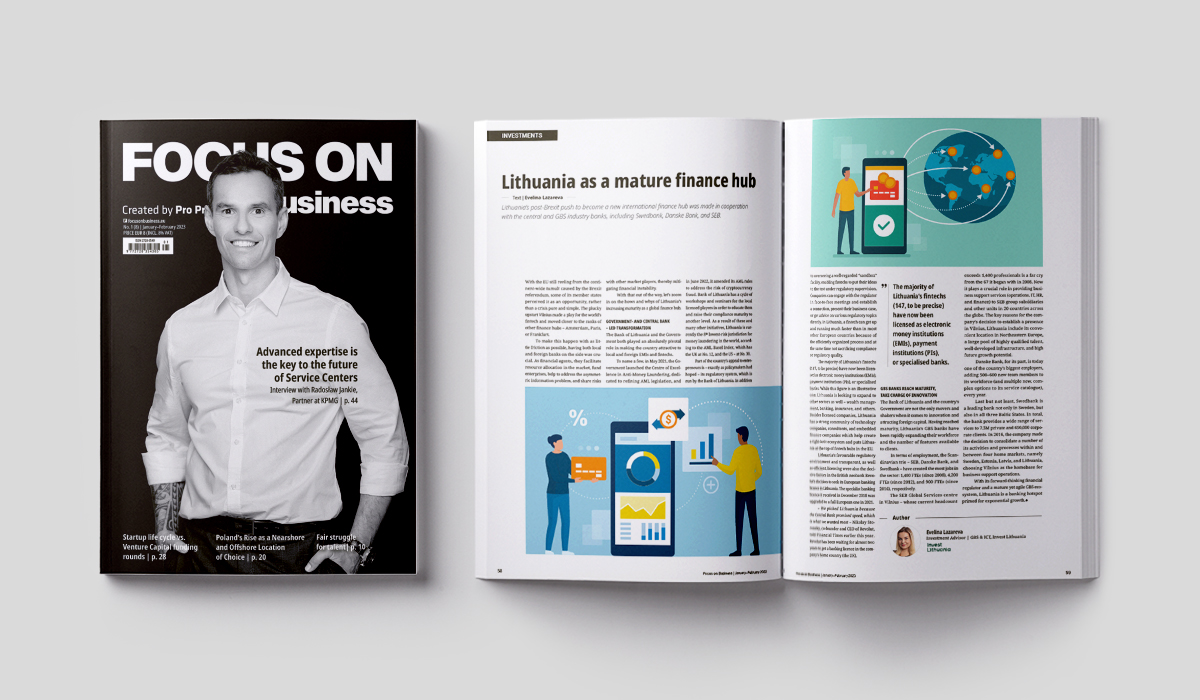This article was originally published on Focus on Business
Author: Evelina Lazareva, an Investment Advisor, Business services & ICT at Invest Lithuania
Lithuania’s post-Brexit push to become a new international finance hub was made in cooperation with the central and GBS industry banks, including Swedbank, Danske Bank, and SEB.
With the EU still reeling from the continent-wide tumult caused by the Brexit referendum, some of its member states perceived it as an opportunity, rather than a crisis pure and simple. The plucky upstart Vilnius made a play for the world’s fintech and moved closer to the ranks of other finance hubs – Amsterdam, Paris, or Frankfurt.
To make this happen with as little friction as possible, having both local and foreign banks on the side was crucial. As financial agents, they facilitate resource allocation in the market, fund enterprises, help to address the asymmetric information problem, and share risks with other market players, thereby mitigating financial instability.
With that out of the way, let’s zoom in on the hows and whys of Lithuania’s increasing maturity as a global finance hub.
Government- and Central Bank – led transformation
The Bank of Lithuania and the Government both played an absolutely pivotal role in making the country attractive to local and foreign EMIs and fintechs. To name a few, in May 2021, the Government launched the Centre of Excellence in Anti-Money Laundering, dedicated to refining AML legislation, and in June 2022, it amended its AML rules to address the risk of cryptocurrency fraud. Bank of Lithuania has a cycle of workshops and seminars for the local licensed players in order to educate them and raise their compliance maturity to another level. As a result of these and many other initiatives, Lithuania is currently the 8th lowest-risk jurisdiction for money laundering in the world, according to the AML Basel Index, which has the UK at No. 12, and the US – at No. 30.
Part of the country’s appeal to entrepreneurs is – exactly as policymakers had hoped – its regulatory system, which is run by the Bank of Lithuania. In addition to overseeing a well-regarded “sandbox” facility, enabling fintechs to put their ideas to the test under regulatory supervision. Companies can engage with the regulator in face-to-face meetings and establish a connection, present their business case, or get advice on various regulatory topics directly. In Lithuania, a fintech can get up and running much faster than in most other European countries because of the efficiently organized process and at the same time not sacrificing compliance or regulatory quality.
The majority of Lithuania’s fintechs (147, to be precise) have now been licen[1]sed as electronic money institutions (EMIs), payment institutions (PIs), or specialised banks. While this figure is an illustrative one, Lithuania is looking to expand to other sectors as well – wealth management, banking, insurance, and others. Besides licensed companies, Lithuania has a strong community of technology companies, consultants, and embedded finance companies which help create a tight-knit ecosystem and puts Lithuania at the top of fintech hubs in the EU.
Lithuania’s favourable regulatory environment and transparent, as well as efficient, licensing were also the decisive factors in the British neobank Revolut’s decision to seek its European banking licence in Lithuania. The specialist banking licence it received in December 2018 was upgraded to a full European one in 2021.
– We picked Lithuania because the Central Bank promised speed, which is what we wanted most – Nikolay Storonsky, co-founder and CEO of Revolut, told Financial Times earlier this year. Revolut has been waiting for almost two years to get a banking licence in the company’s home country (the UK).
GBS banks reach maturity, take charge of innovation
The Bank of Lithuania and the country’s Government are not the only movers and shakers when it comes to innovation and attracting foreign capital. Having reached maturity, Lithuania’s GBS banks have been rapidly expanding their workforce and the number of features available to clients.
In terms of employment, the Scandinavian trio – SEB, Danske Bank, and Swedbank – have created the most jobs in the sector: 1,400 FTEs (since 2008), 4,200 FTEs (since 2012), and 900 FTEs (since 2016), respectively.
The SEB Global Services centre in Vilnius – whose current headcount exceeds 1,400 professionals is a far cry from the 67 it began with in 2008. Now it plays a crucial role in providing business support services (operations, IT, HR, and finance) to SEB group subsidiaries and other units in 20 countries across the globe. The key reasons for the company’s decision to establish a presence in Vilnius, Lithuania include its convenient location in Northeastern Europe, a large pool of highly qualified talent, well-developed infrastructure, and high future growth potential.
Danske Bank, for its part, is today one of the country’s biggest employers, adding 500–600 new team members to its workforce (and multiple new, complex options to its service catalogue), every year.
Last but not least, Swedbank is a leading bank not only in Sweden, but also in all three Baltic States. In total, the bank provides a wide range of services to 7.3M private and 650,000 corporate clients. In 2016, the company made the decision to consolidate a number of its activities and processes within and between four home markets, namely Sweden, Estonia, Latvia, and Lithuania, choosing Vilnius as the homebase for business support operations.
With its forward-thinking financial regulator and a mature yet agile GBS ecosystem, Lithuania is a banking hotspot primed for exponential growth.













